


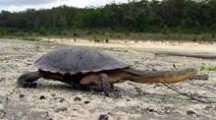
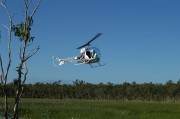

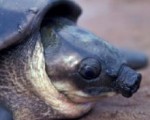

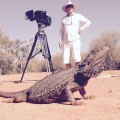

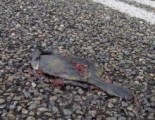

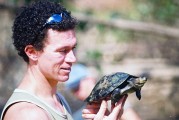

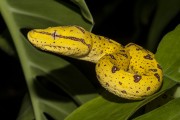
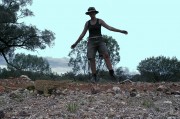


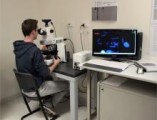
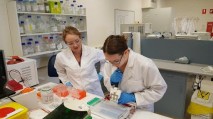
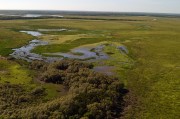
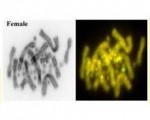
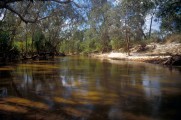



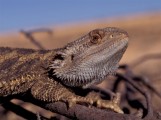
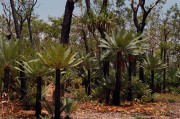

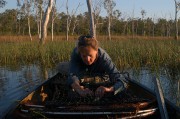




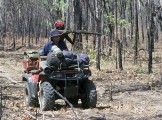

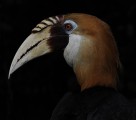



Genomics@UC
Introduction
Genomics is currently undergoing a revolution brought about by the advent of high-throughput parallel sequencing and powerful cytogenetic techniques such as fluorescent in-situ hybridization (FISH) and comparative genomic hybridization (CGH). This has opened new opportunities to study non-model organisms, such as reptiles and amphibians, in ways that were previously restricted to human and mouse.
Of special interest to our lab is the comparative genomics of sex determination in reptiles. Sex determination has been a topic of speculation and rigorous inquiry since the time of Aristotle, and remains a hot topic today because of its intrinsic interest as a fundamental biological process, and because greater understanding brings benefit for human health. Our team at the University of Canberra is using frontier DNA technologies to probe the astonishingly diverse mechanisms of sex determination in reptiles.
Pogona Pvi1.1
As part of this research, we have collaborated with the Beijing Genome Institute (BGI, Shenzhen) to generate an annotated genome for the Australian central bearded dragon Pogona vitticeps. The annotated genome is complete, published in GigaScience, and a dense physical mapping of the genome is now also available through BMC Genomics. The resource includes a BAC library available commercially from Amplicon Express and a series of transcriptomes from a range of tissues.
Browse the Pogona Genome
- GBrowse genome pvi1.1 (Jan 2013)
- NCBI Browser [Conversion from pvi1.1 Gbrowse labels to NCBI labels]
Blast the Pogona Genome
Download sequence and assembly files or BLAST the Pogona genome on NCBI (GCA_900067755.1).
Pogona Genome Sequence and Annotation (ftp)
Download a compressed file from GigaDB. containing
- Pogona_vitticeps.male.cds -- Coding sequence of all annotated genes
- Pogona_vitticeps.male.pep -- Peptide sequence of all annotated genes
- Pogona_vitticeps.male.gff -- All annotations (mRNAs and repeats)
- Pogona_vitticeps.male.fa.ltr_finder.gff -- Annoteted long terminal repeats
- Pogona_vitticeps.male.fa.Proteinmask.annot.gff -- Annotated transposable element proteins
- Pogona_vitticeps.male.fa.RepeatMasker.out.gff -- Annoted repeat masker output
- Pogona_vitticeps.male.fa.repeatmodeler.gff -- Annoteed repeat modeler output
- Pogona_vitticeps.male.fa.trf.dat.gff -- Annotated tandem repeats
Pogona transcriptome sequences used for annotation
Download RNASeq files from the ENA repository (Accession ERZ097159).
Latest Pogona Assemblies
We are currently working with BioPlatforms Australia, the Garvan Institute Sydney and PacBio Singapore to generate a high quality fully-phased genome assembly and annotation for a Pogona vitticeps ZW individual. This assembly is based on both PacBio HiFi and Oxford Nanopore Promethion long read platforms, polished with Illumina short reads. HiC has been used for additional scaffolding. The N50 for this assembly is currently sitting at 203 Mb contigs without HiC scaffolding. Collaboration in milking this assembly for what it is worth are most welcome.
Publications
Dense Physical Map: Deakin, J., Edwards, M.J., Patel, H., O'Meally, D., Lian, J., Stenhouse, R., Ryan, S., Livernois, A., Azad, B., Holleley, C., Li, Q. and Georges, A. 2016. Anchoring genome sequence to chromosomes of the central bearded dragon (Pogona vitticeps) enables reconstruction of ancestral squamate macrochromosomes and identifies sequence content of the Z chromosome. BMC Genomics 17:447.
Genome: Georges, A., Li, Q., Lian, J., O'Meally, D., Deakin, J., Wang, Z., Zhang, P., Fujita, M., Patel, H.R., Holleley, C.E., Zhou, Y., Zhang, X., Matsurbara, K., Waters, P., Graves, J.A.M., Sarre, S.D. and Zhang, G. 2015. High-coverage sequencing and annotated assembly of the genome of the Australian dragon lizard Pogona vitticeps. GigaScience 4:45.
BAC Anchors: Young, M.J., O'Meally, D., Sarre, S.D., Georges, A. and Ezaz, T. 2013. Molecular cytogenetic map of the central bearded dragon Pogona vitticeps (Squamata: Agamidae). Chromosome Research 21:361-374.
Interleukin Genes: Livernois, A., Hardy, K. Domaschenz, R, Papankilaou, A, Georges, A., Sarre, S., Rao, S., Ezaz, T. and Deakin, J. 2016. Identification of interleukin genes in Pogona vitticeps using a de novo transcriptome assembly from RNA-Seq data. Immunogenetics 68:719–731.
